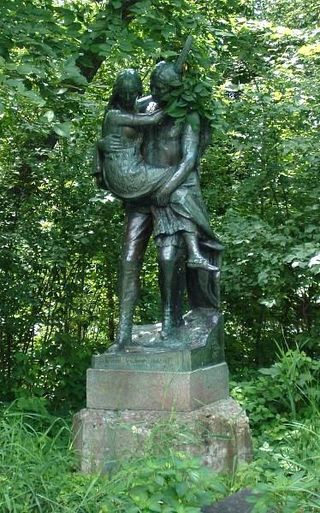Related Research Articles

Scouting in South Dakota has a long history, from the 1910s to the present, and serves thousands of youth in programs that suit the environment in which they live.

Hiawatha is a city in Linn County, Iowa, United States. It is a suburb located in the northwestern side of Cedar Rapids and is part of the Cedar Rapids Metropolitan Statistical Area. The population was 7,183 at the time of the 2020 census, an increase from 6,480 in 2000.

Hiawatha is the largest city and county seat of Brown County, Kansas, United States. As of the 2020 census, the population of the city was 3,280.

The Song of Hiawatha is an 1855 epic poem in trochaic tetrameter by Henry Wadsworth Longfellow which features Native American characters. The epic relates the fictional adventures of an Ojibwe warrior named Hiawatha and the tragedy of his love for Minnehaha, a Dakota woman. Events in the story are set in the Pictured Rocks area of Michigan on the south shore of Lake Superior. Longfellow's poem is based on oral traditions surrounding the figure of Manabozho, but it also contains his own innovations.
Hiawatha (Haiëñ'wa'tha) is a Native American semi-historical figure who was the co-founder of the Iroquois Confederacy.

The Hiawathas were a fleet of named passenger trains operated by the Chicago, Milwaukee, St. Paul and Pacific Railroad between Chicago and various destinations in the Midwest and Western United States. The most notable of these trains was the original Twin Cities Hiawatha, which served the Twin Cities in Minnesota. The train was named for the epic poem The Song of Hiawatha by Henry Wadsworth Longfellow.
Cedar Valley (Nature) Trail is a rail trail running 52 miles (84 km) from Hiawatha, Iowa to Waterloo, Iowa.

Kirkwood Community College is a public community college in Cedar Rapids, Iowa with several additional regional and county centers located in Belle Plaine, Coralville, Hiawatha, Monticello, Tipton, Vinton, Washington and Williamsburg.
KFMW, known as "Rock 108", is a radio station based in Hiawatha, Iowa. The station has an active rock format. Its signal is transmitted from the AFLAC Tower north of Rowley, Iowa.
Kennedy High School is a public high school located in Cedar Rapids, Iowa. Kennedy was founded in 1967. The building was dedicated by Senator Edward M. Kennedy, younger brother of the school's namesake President John F. Kennedy. The school's athletic teams are known as the Cougars. It is a part of the Cedar Rapids Community School District.

The Midwest Hiawatha was a passenger train on the Milwaukee Road, one of many Milwaukee Road trains with a Hiawatha name. The service began December 11, 1940 between Chicago's Union Station and Omaha, Nebraska, Sioux Falls, South Dakota, through northern Illinois and Iowa and South Dakota.

KMJM is a radio station licensed to serve Cedar Rapids, Iowa. The station is owned by iHeartMedia, Inc. and licensed to iHM Licenses, LLC. It airs an oldies music format including Cedar Rapids Roughriders hockey, Coe College football, and serves as an overflow station for University of Iowa men's and women's basketball when games conflict with another Hawkeye event airing on sister station WMT.

KHAK is a radio station that broadcasts a country music format to the Cedar Rapids-Iowa City, Iowa area. Licensed to Cedar Rapids, the station is currently owned by Townsquare Media. KHAK's studios are located in the Alliant Energy Building on Second Street SE in Cedar Rapids, and its transmitter is located near US-30/US-151 and Ivanhoe Road on the south side of Cedar Rapids.

KXGM is an FM radio station licensed to serve Hiawatha, Iowa, United States. The station is owned by Educational Media Foundation. It airs a Christian worship music format.

The Skytop Lounges were a fleet of streamlined passenger cars with the parlor-lounge cars built by the Chicago, Milwaukee, St. Paul and Pacific Railroad and sleeper-lounges built by Pullman-Standard in 1948. The cars were designed by famed industrial designer Brooks Stevens. The fleet included both parlor-lounges and sleeping cars. The lounges entered service in 1948 on the Twin Cities Hiawatha, while the sleeping cars were used on the long-distance Olympian Hiawatha. In 1964 the Milwaukee Road sold the sleeping cars to the Canadian National Railway, which operated them until 1977. The parlor cars continued in service with the Milwaukee Road until 1970, when they were retired.

The West Hill Historic District in Muscatine, Iowa is a historic district that was listed on the National Register of Historic Places in 2008. At that time, it included 258 contributing buildings, two contributing objects, two contributing sites, and 67 non-contributing buildings. The city of Muscatine was established as Bloomington in 1836. The original town was built on land that is generally flat along the Mississippi River. Residential areas were built on the surrounding hills, while commercial and industrial interests developed on the flatter land near the river. The West Hill Historic District is immediately to the west of the Downtown Commercial Historic District. The period of significance for West Hill begins in 1839 and ends in 1958. Some of the largest and oldest historic houses in Muscatine are located here, but it also includes smaller residences of the working and middle class. By 1915, 180 of the historic houses had been built. The rest were built from 1916 to 1958. Another eight houses were built between 1960 and 1995. A majority of the houses (80%) are two stories in height. Frame construction (70%) outnumbers brick construction (30%). The architectural styles that were prominent across the country are also found here and were built at the time they were popular.
Anniversary (Anniversaire) is a 1963 Canadian short documentary film produced by the National Film Board of Canada and directed by William Weintraub.
The Hiawatha Athletics were a minor league baseball team based in Hiawatha, Kansas. In 1912, the Athletics played as members of the Class D level Missouri-Iowa-Nebraska-Kansas League. The Athletics were immediately precedec in minor league play by the 1910 Hiawatha Indians, who played the season as a member of the short-lived Class D level Eastern Kansas League. Both Hiawatha teams hosted home minor league games at League Park.
Aime Wichtendahl is the first transgender woman to be elected to Iowa's government as a chair on Hiawatha's City Council. She was elected to one of three seats on Hiawatha's City Council in 2015 and was re-elected for a second term in 2019. She is a member of the Democratic Party.
References
- "Fay Clark: The Spiritual Swashbuckler," Des Moines Register Picture Magazine
- Fay Clark: You Will Take it With You, Hiawatha Publishing
- "Hiawatha History". City of Hiawatha. Archived from the original on 2011-07-10.
Fay Clark. Into the Light. Perry, Iowa: Pyramid Publishers of Iowa, 1988.